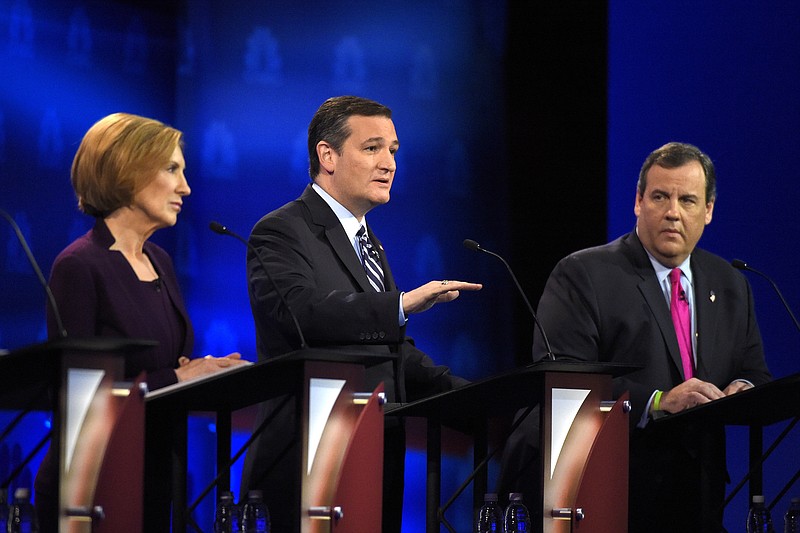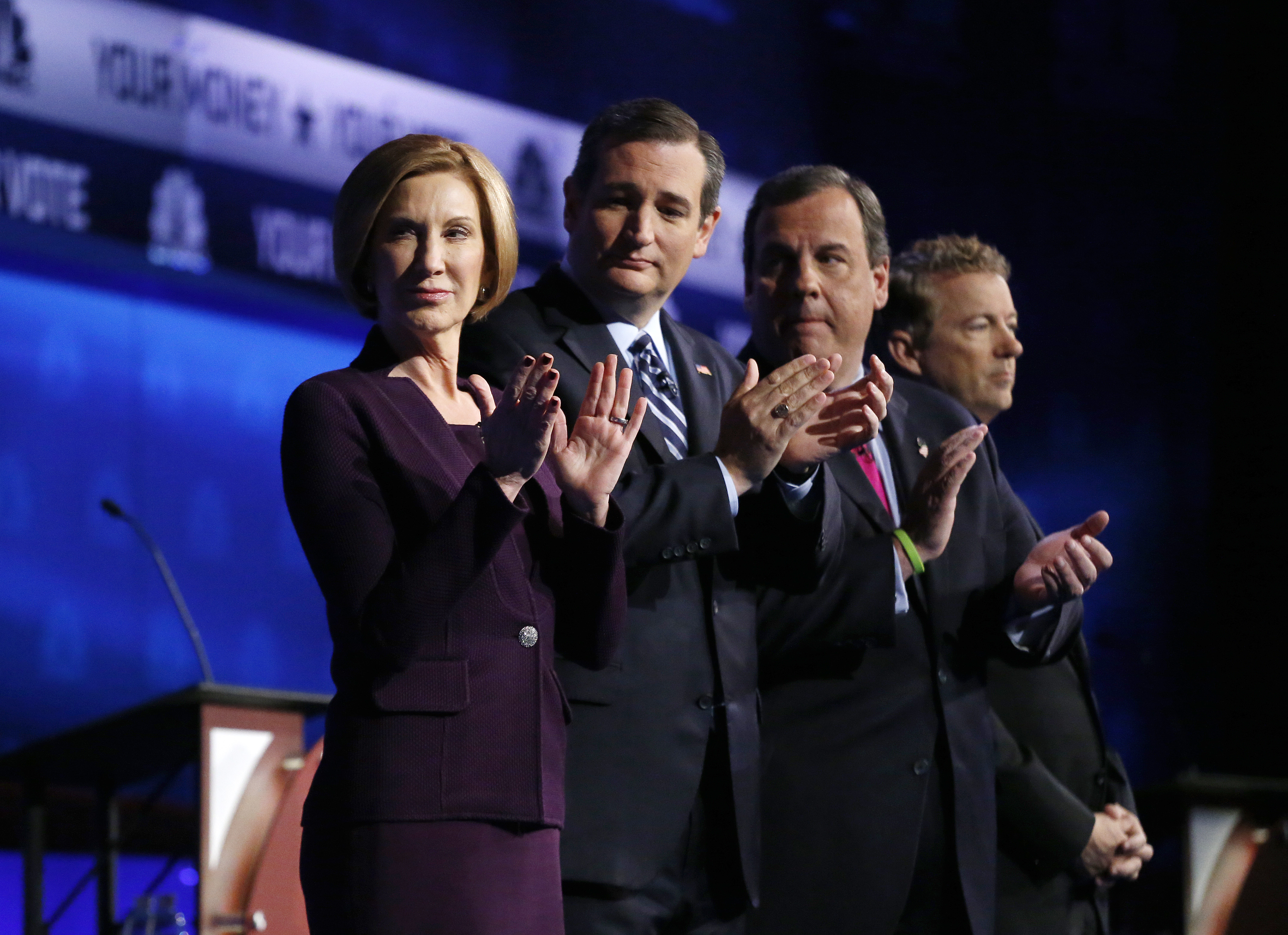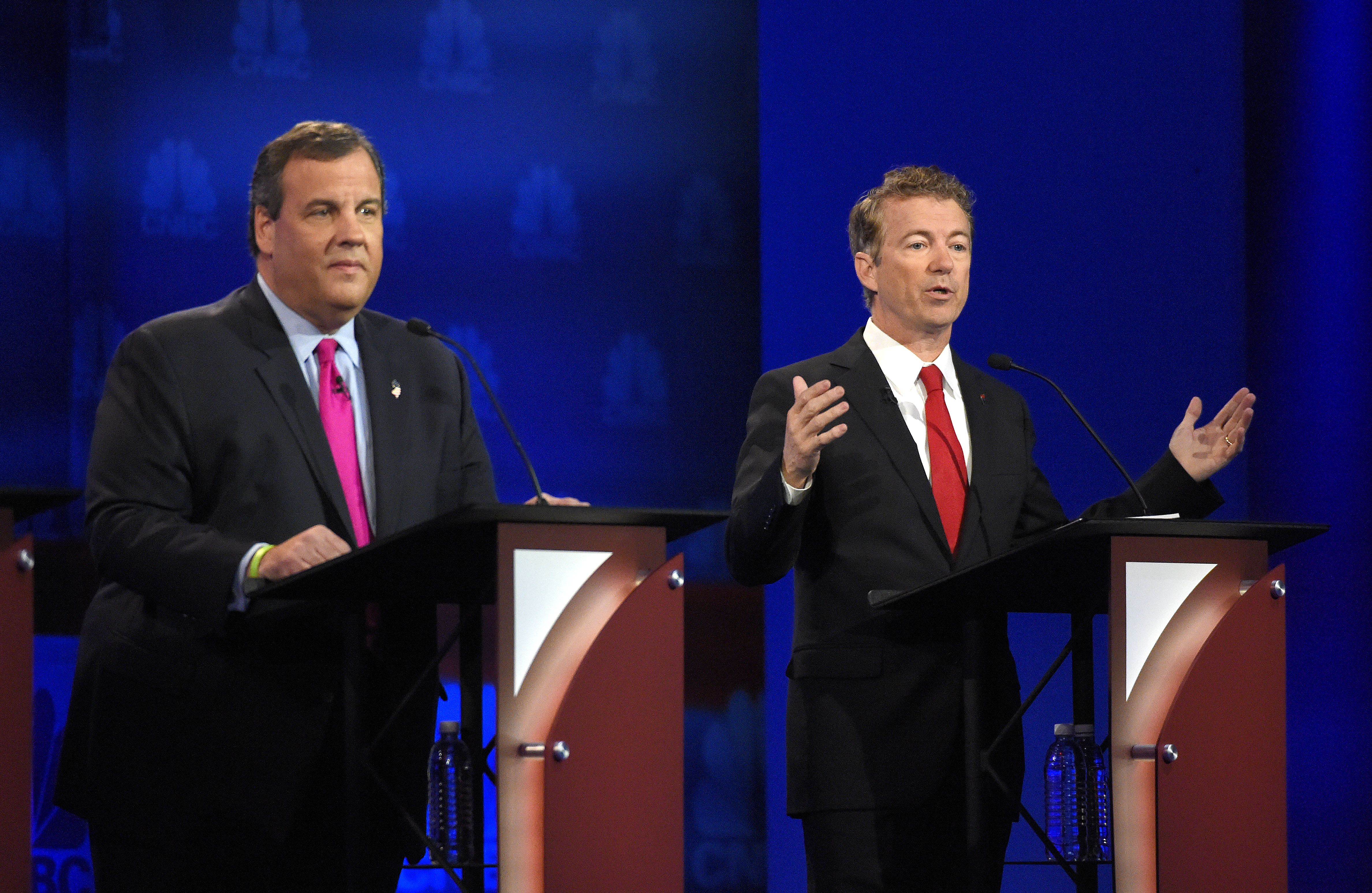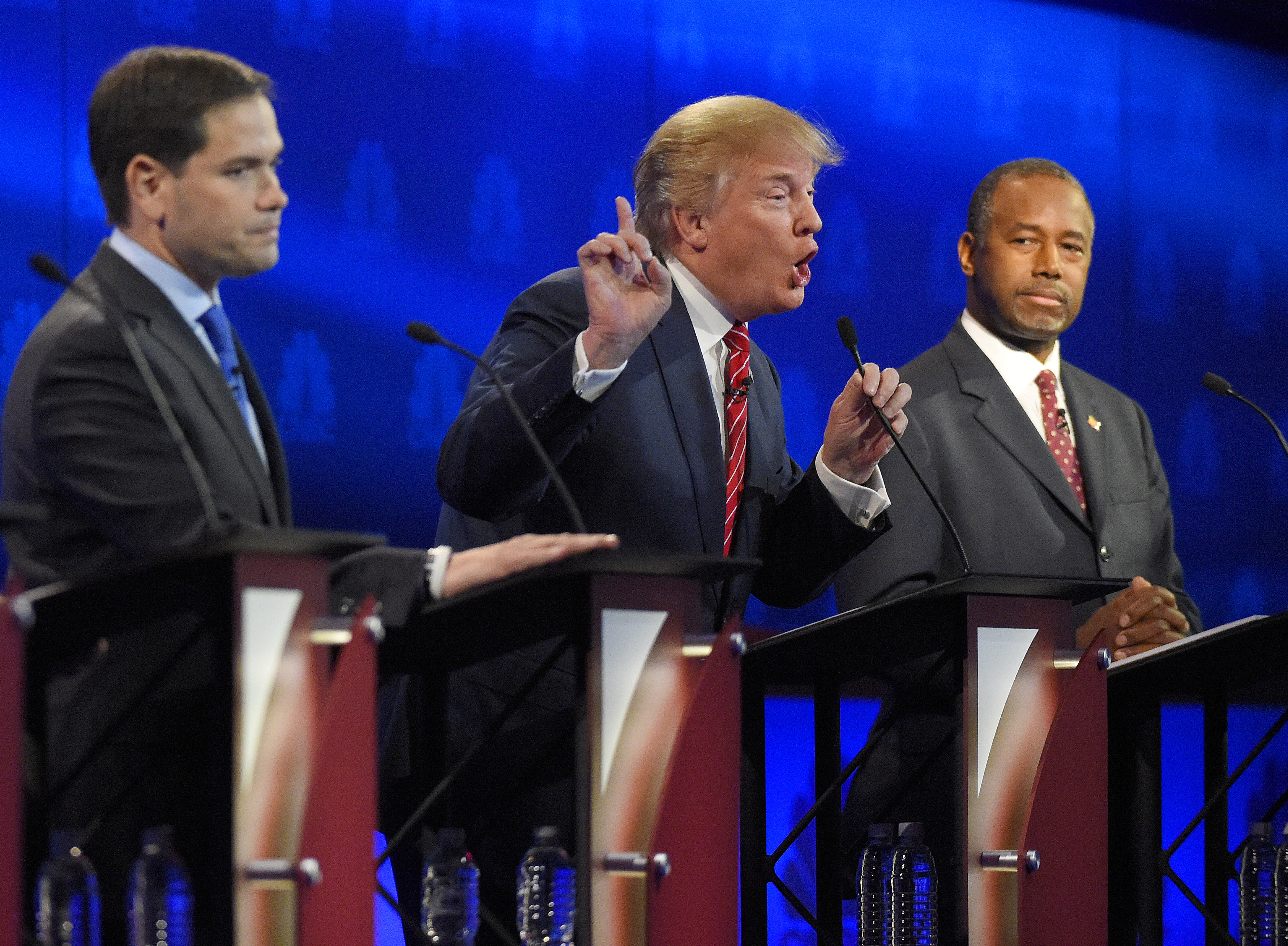BOULDER, Colo. - Marco Rubio bid forcefully for control of the Republican Party's establishment wing in Wednesday night's third GOP debate, deflecting jabs from Jeb Bush, who desperately sought to right his floundering campaign.
Insurgent outsiders Donald Trump and Ben Carson defended the seriousness of their White House efforts, underscoring the two-track fight for the party's presidential nomination. But in an economic policy focuseddebate, both at times faded to the background during the two-hour contest.
Rubio tangled early with Bush, his friend and fellow Floridian, who entered the debate in need of a strong performance to soothe his supporters' anxiety. Bush targeted Rubio for his spotty voting record on Capitol Hill, signaling that he sees the Florida senator as the candidate most likely to block his political path.
"Marco, when you signed up for this, this was a 6-year term and you should be showing up for work," said Bush, who was forced to slash campaign spending in response to slower fundraising. "You can campaign, or just resign and let someone else take the job."
Rubio sharply dismissed Bush's critique as a political ploy by a struggling candidate.
"The only reason you're doing it is that we're running for the same position and someone has convinced you that attacking me will help you," he said.
Three months before primary voting begins, the Republican contest remains crowded and unwieldly. Yet the contours of the race have been clarified, with outsiders capitalizing on voter frustration with Washington and candidates with political experience hoping the race ultimately turns their way.
Trump, the brash real estate mogul, has dominated the Republican race for months, but was a less of a factor Wednesday night than in the previous two debates. He largely refrained from personal attacks on his rivals, which has been a signature of his campaign, even taking a light touch with Carson, who has overtaken him in recent Iowa polls.
Carson, the soft-spoken retired neurosurgeon who came into the debate with a burst of momentum, stuck to his low-key style. He sought to explain his vague tax policy, which he has compared to tithing, in which families donate the same portion of their income to their church regardless of how much they make. And he insisted he had no involvement with supplement maker Mannatech, although he acknowledged using its product and giving paid speeches for the company, which has faced a legal challenge over health claims for its products.
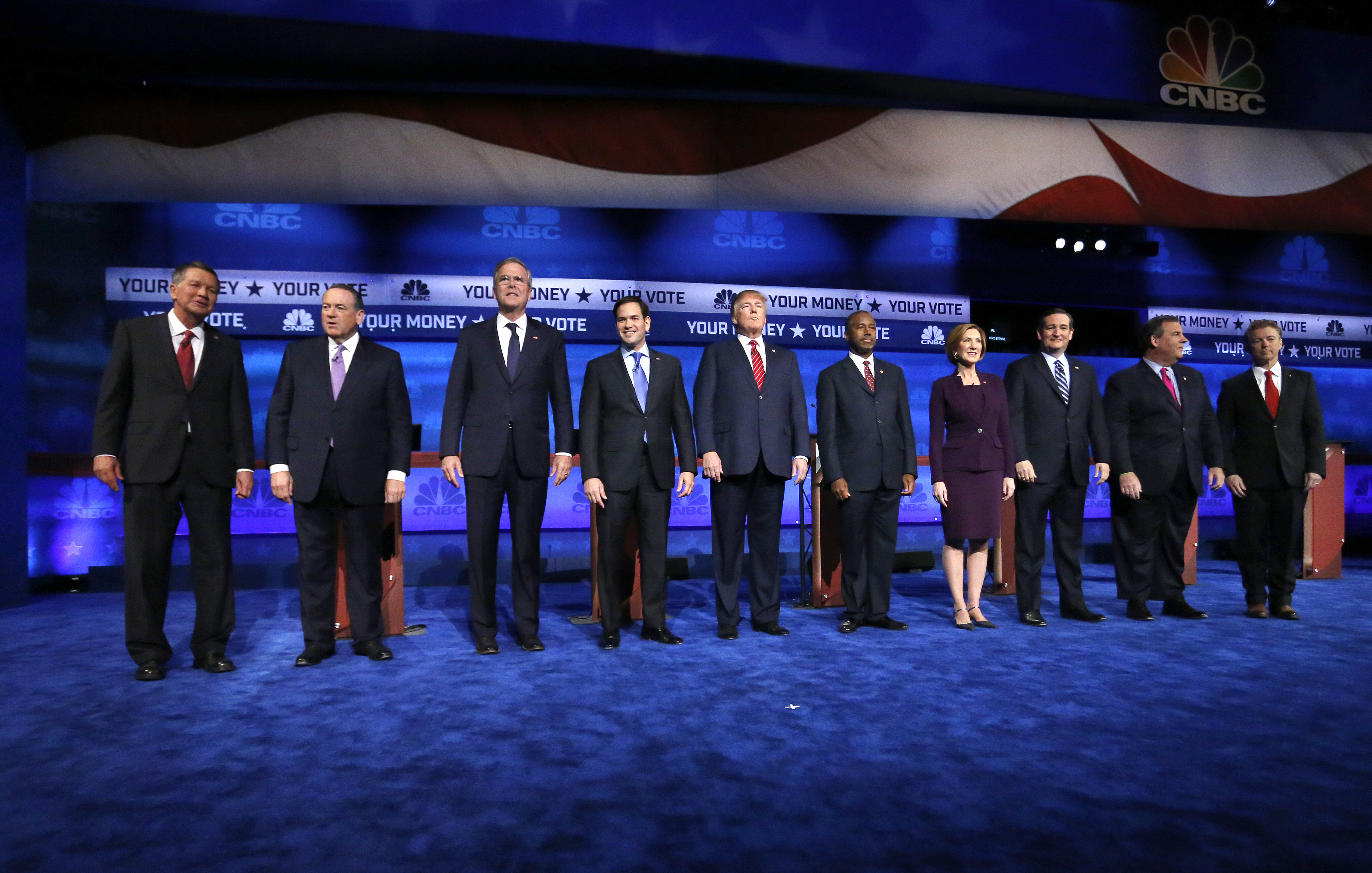 Republican presidential candidates, from left, John Kasich, Mike Huckabee, Jeb Bush, Marco Rubio, Donald Trump, Ben Carson, Carly Fiorina, Ted Cruz, Chris Christie, and Rand Paul take the stage during the CNBC Republican presidential debate at the University of Colorado, Wednesday, Oct. 28, 2015, in Boulder, Colo.
Republican presidential candidates, from left, John Kasich, Mike Huckabee, Jeb Bush, Marco Rubio, Donald Trump, Ben Carson, Carly Fiorina, Ted Cruz, Chris Christie, and Rand Paul take the stage during the CNBC Republican presidential debate at the University of Colorado, Wednesday, Oct. 28, 2015, in Boulder, Colo. Carson said it was absurd to allege he's connected to the company. "If someone put me on their home page, they did it without permission," he said.
Trump bristled when asked by a debate moderator if his policy proposals, including building a wall along the U.S.-Mexico border and deporting everyone who is in the U.S. illegally, amounted to a "comic book" campaign. And he defended his record in the private sector despite having to declare bankruptcy, casting it as a business technique.
"I've used that to my advantage as a businessman," Trump said. "I used the laws of the country to my benefit."
Texas Sen. Ted Cruz has been circling Trump for months, seeking to position himself as the heir to the businessman's supporters if he fades. While Cruz holds office in the U.S. Senate, he's cast himself as anti-establishment and a thorn in the side of GOP leaders.
Cruz garnered enthusiastic applause when he criticized debate moderators for trying to stir up fights among the candidates, casting it as a sign of media bias against Republicans - a popular line with GOP voters.
The jumbled GOP field is a stark contrast to the Democratic contest, where Hillary Rodham Clinton is strengthening her front-runner status over Vermont Sen. Bernie Sanders. Campaigning in New Hampshire ahead of the GOP debate, Clinton said the Republican contests are like a "reality TV show but the cast of characters are out of touch with actual reality."
Wednesday's debate in Colorado, an important general election state, focused on economic policy, including taxes and job growth.
Rubio turned questions about his personal financial struggles, including recently liquidating his retirement account, into an opportunity to tout his compelling personal story. The son of Cuban immigrants, Rubio said he didn't inherit money from his family and knows what it's like to struggle to pay loans and afford to raise a family.
"I know what it's like to owe that money," Rubio said. "I'm not worried about my finances. I'm worried about the finances of everyday Americans."
The feud between Bush and Rubio has been simmering for months, driven by the former Florida governor's concern that his talented protege could eclipse him. Rubio is among the Republican field's most talented politicians, and at age 44 he could represent the future in a way the son and brother of presidents cannot.
Bush has cast himself as a policy wonk and delivered measured answers to questions on tax policy and the nation's budget. But other than his sharp critique of Rubio, Bush had few of the standout moments his supporters were seeking.
Ohio Gov. John Kasich and New Jersey Gov. Chris Christie have each sought to break through with more mainstream voters. Kasich in particular was aggressive from the start in bemoaning the unexpected strength of unorthodox candidates.
"We are on the verge of perhaps picking someone who cannot do this job," Kasich said.
Christie, whose campaign has so far failed to meet expectations, cast himself as best qualified to defeat Clinton in the general election.
"You put me on the stage with her next September and she won't get within 10 miles of the White House," he said.
Also on stage were former Arkansas Gov. Mike Huckabee, Kentucky Sen. Rand Paul and former technology executive Carly Fiorina, the star of the second GOP debate. Fiorina, the former Hewlett Packard CEO, has struggled to capitalize on that strong performance and has faded toward the back of the pack.
The four lowest-polling candidates participated in an earlier undercard event: South Carolina Sen. Lindsay Graham, former Pennsylvania Sen. Rick Santorum, Louisiana Gov. Bobby Jindal and former New York Gov. George Pataki. None has gotten close to breaking into the upper tier of candidates.
AP FACT CHECK: The Republican debaters and the facts
WASHINGTON - Ben Carson pitched a tax plan with numbers that didn't add up. Donald Trump boasted that he's paying his own way in the campaign, but he isn't. Chris Christie accused the government of stealing Social Security money that it has actually borrowed - and has been paying back with interest. Even the price of hamburger got a bad rap in the latest Republican presidential debate, thanks to Ted Cruz. A look at some of the claims Wednesday night and how they compare with the facts: ___ CARSON: His proposed flat-rate tax, which would have everyone pay an income tax rate of about 15 percent, "works out very well" in budget terms because it would spark enough economic growth to offset the lower rate. THE FACTS: Carson says his proposed tax would not increase the budget deficit because he would tax the entire economic output of the U.S. - the gross domestic product - plus corporate income and capital gains. Carson has not laid out a detailed plan, so it is difficult to measure how it would affect revenues or the economy. But based on what he said, he's double counting because corporate revenues are part of the GDP. A tax rate of 15 percent would be a huge tax cut for the wealthy. The top income tax rate for individuals is now 39.6 percent. The corporate tax rate for corporations is 35 percent. To help offset the rate cuts, Carson said he would "get rid of all the deductions and all the loopholes." That's a bold proposal, considering how popular many tax breaks are, including deductions for interest on home mortgages and charitable contributions, as well as exemptions for health insurance and retirement savings. ___ TRUMP: "I'm putting up 100 percent of my own money." THE FACTS: No, he's not. Of $3.9 million raised for his campaign in the latest fundraising quarter, only $100,000 came from his own pocket. That was one major revelation from the latest batch of presidential fundraising reports, filed Oct. 15 with the Federal Election Commission. That's a drastic shift from his springtime fundraising report, when he loaned his campaign nearly all of the $1.9 million it had. ___ CHRISTIE: FBI Director James Comey said police officers are holding back "because of a lack of support from politicians like the president of the United States." THE FACTS: That's not what Comey said. In a speech last week about an alarming rise in crime, Comey said some officers feel under siege because of the spread of viral videos taken by young people with cell phones. Comey said he'd heard about one police official who told his force "their political leadership has no tolerance for a viral video." But Comey never mentioned Obama or blamed politicians for failing to support police. And Comey made clear he didn't have data to back up his gut impression. Christie also said when Obama was asked to speak about the issue, he declined to support police. In fact, Obama gave a firm defense of police on Tuesday, telling a police chiefs convention that "this country is safer because of your efforts." ___ BUSH: "Marco, when you signed up for this, this was a six-year term, and you should be showing up for work." RUBIO: "Barack Obama missed 60 or 70 percent of his votes" when running for president while he was in the Senate. THE FACTS: Bush correctly cited Rubio's spotty attendance record in the Senate since running for president, but ignored the fact that this is common when someone in public office runs a White House campaign -and previous candidates were absent far more often. Bush himself is free to run for president as he pleases, because he doesn't have a day job from which to be absent. For his part, Rubio didn't offer a fair comparison when comparing his Senate voting rate with Obama's. From Oct. 27, 2014, to Oct. 26, 2015, Rubio was absent for 26 percent of Senate votes, a worse attendance record than other senators running for president, according to an analysis by GovTrack.us, which tracks congressional voting records. But in a comparable period in the 2008 race - from Oct. 23, 2006, to Oct. 22, 2007, Obama was absent for 29 percent of votes, a bit more than Rubio's absences, but not as much more as Rubio charged. Republican John McCain was absent for 51 percent of Senate votes in that period. Both Obama and McCain went on to miss an even bigger share of Senate votes as the election progressed - an expected development bound to be seen again in 2016. ___ CHRISTIE: The federal government has "stolen" the Social Security taxes paid by workers and spent it on other things. "It isn't their money any more... It got stolen from them. It's not theirs anymore. The government stole it and spent it a long time ago." THE FACTS: The money is not stolen, it's borrowed. Over the past 30 years, Social Security has collected about $2.7 trillion more in payroll taxes than it has paid in benefits. By law, the Treasury Department has invested the surplus in U.S. Treasury bonds. Over that same time period, the federal government has run budget deficits in all but a few years. To finance the deficits, the government has borrowed money, from other government agencies as well as public debt markets. The money from Social Security has been spent, but Social Security holds Treasury bonds worth $2.7 trillion, backed by the full faith and credit of the U.S. government. Saying the money has been stolen assumes that the federal government will not honor the bonds. Social Security has been paying out more in benefits than it collects in taxes since 2010. The program has been able to pay full benefits because the federal government has honored the bonds. ___ SEN. TED CRUZ: "If you look at a single mom buying groceries, she sees hamburger prices have gone up nearly 40 percent. She sees her cost of electricity going up. She sees her health insurance going up. And loose money is one of the major problems." THE FACTS: Americans may be facing many economic challenges, but rising inflation isn't one of them. And "loose money," a way of describing the Federal Reserve's low interest rate policies, isn't to blame for expensive hamburgers. Beef prices rose 21 percent in January of this year compared with a year earlier. That reflected a Midwest drought that had caused some cattle ranchers to cull their herds. Beef prices have since settled down and were up just 1 percent in September from a year earlier. Electricity costs have actually fallen 0.4 percent during that period. Those are national averages, so some local areas will have different figures. Overall, inflation has remained below even the Fed's 2 percent target for the past three years. In fact, the government's primary inflation measure, the consumer price index, has actually been unchanged in the past 12 months. ___ TRUMP: Asked about his criticism of Rubio for his support for increasing the number of high-skilled foreign workers given visas to work in the U.S. - calling Rubio Facebook CEO "Mark Zuckerburg's personal senator" - Trump denied ever making the comment. "I never said that. I never said that," he said. THE FACTS: He did say it, on his own website. Trump's immigration policy calls for a different approach - raising the prevailing wage for the jobs that attract high-skilled foreign workers, in hopes that they'll be filled by more Americans. Trump's policy statement said doing that "will improve the number of black, Hispanic and female workers in Silicon Valley who have been passed over in favor of the H-1B program. Mark Zuckerberg's personal Senator, Marco Rubio, has a bill to triple H-1Bs that would decimate women and minorities." ___ SEN. RAND PAUL: The new budget agreement "will explode the deficit, it will allow President Obama to borrow unlimited amounts of money." THE FACTS: The agreement allows $80 billion more spending over the next two years, which is only a small addition to the $3.67 trillion the government spends every year. The government's annual budget deficit has declined to $439 billion, about 2.5 percent of GDP, below the average for the past 40 years. Overall, whatever its faults, most economists have responded to this week's budget deal between Congress and the White House with a sigh of relief. The agreement, approved by the House earlier Wednesday, sets funding levels and extends the government's borrowing limit for two more years, thereby taking the threat of a government shutdown and debt default off the table. A 2013 budget fight led to a 16-day partial government shutdown that was widely blamed by most economists for sharp drops in consumer and business confidence that dragged on the economy. ___ GEORGE PATAKI: "Hillary Clinton put a server, an unsecure server, in her home as secretary of state. We have no doubt that that was hacked, and that state secrets are out there to the Iranians, the Russians, the Chinese and others." THE FACTS: The former New York governor, speaking in the undercard debate, exaggerated what's actually known about what happened to the emails of Clinton, the Democratic front-runner for her party's presidential nomination. While Clinton's email server was poorly configured and therefore more susceptible to hacking, there is no evidence of intrusion. The FBI is studying the server, which was subjected to a phishing attack by Russian-linked hackers while she was secretary of state. It's not known whether she clicked on any attachments, which would have exposed her account. Her account was also apparently the subject of cyberattacks originating in China, South Korea and Germany after she left office in early 2013. Determining whether a hack was sponsored by a nation, rather than just originating from that country, is notoriously difficult.
